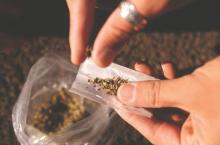Verbal memory was significantly worse in middle-aged adults who had used marijuana throughout their adult lives, according to Dr. Reto Auer of the University of Lausanne (Switzerland) and associates.
They collected data from Coronary Artery Risk Development in Young Adults (CARDIA) study subjects who were assessed after 25 years of participation in a battery of cognitive tests, with 391 people reporting current marijuana use, 2,443 reporting past but not current marijuana use, and 531 people reporting never having used marijuana. Mean scores on the Rey Auditory Verbal Learning Test (RAVLT) were 8.6 for people who had never used marijuana, 8.4 in the past marijuana usage group, and 7.2 in the current marijuana usage group.
RAVLT scores were lowest in people who reported using marijuana every day for the past 30 days, at 6.2. There was no significant difference in scores between groups that had used marijuana 1-10 times and 11-29 times over the past 30 days, but both groups were higher than the every day usage group and lower than those who had not used marijuana in the past 30 days.
People who had 5 or more total marijuana-years had the lowest mean RAVLT scores, but the group with the highest score was actually those who had 1 day to 0.5 marijuana-years, though the difference between this group and the never group was not significant.
No association was found between marijuana usage and lower executive function or processing speed.
“The public health challenge is to find effective ways to inform young people who use, or are considering using, marijuana about the cognitive and other risks of long-term daily use,” Wayne Hall, Ph.D., of the Centre for Youth Substance Abuse Research, University of Queensland, Australia, and Michael Lynskey, Ph.D., of the National Addiction Centre, Kings College London, wrote in an editorial. “Young adults may be skeptical about advice on the putative adverse health effects of marijuana, which they may see as being overstated to justify the prohibition on its use.”
Find the full study (doi: 10.1001/jamainternmed.2015.7841) and editorial (doi: 10.1001/jamainternmed.2015.7850) in JAMA Internal Medicine.


